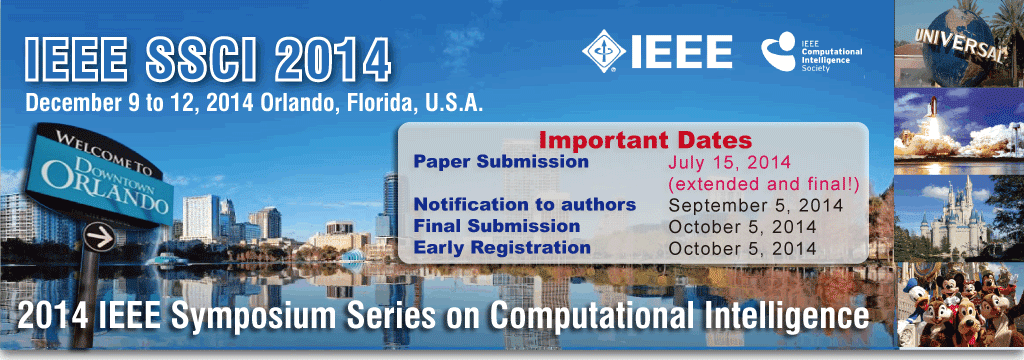- Home
- Final Submission Guidance
- Registration
- Program
- Presentation Guidelines
- Paper Submission
- Important Dates
- Organizing Committee
- Call for Special Sessions
- Call for Papers
- Plenary Speakers
- Keynote Speakers
- Special Sessions
- Doctoral Consortium
- Travel Grants
- Venue
- Accommodation
- Exhibitors
- Local Information
- Contact Us
2014 IEEE Symposium on
Computational Intelligence in Brain Computer Interfaces
(IEEE CIBCI'2014)
December 9-12, 2014, Orlando, Florida, USA
Brain Computer Interfaces (BCIs) have the potential to impact on a range of applications, including assessment and treatment of cognitive impairments and as alternative assistive technologies for the physically impaired. Computational Intelligence (CI) has for many years drawn inspiration from the brain to produce data and signal processing techniques and systems which are capable of learning, evolving, adapting, self-organizing and communicating effectively with humans and machines. CI approaches provide cutting-edge technologies for advanced modeling and signal processing techniques to achieve breakthroughs in BCIs. The CIBCI Symposium focuses on applying advanced computational intelligence tools associated with brain-computer interfaces, and provides a forum for modelers and practitioners to present their newest results and exchange ideas in this rapidly developing field.
Topics
BCI technology enables communication, which does not rely on neuromuscular control thereby offering assistance to those who require alternative communicatory and control mechanisms because of neuromuscular deficiencies due to disease or spinal/brain damage. BCI have advanced significantly in the past few years but there remain a significant number of problems and issues to be resolved due to the high level of noise, and the non-stationary nature of the neural signals used in BCI. In addition to many signal processing related topics and application development associated with field of BCIs we also encourage submissions in the following additional areas of interest:
Computational models of brain circuitry in normal and pathological conditions
Mathematical and neurocomputational models are contributing to the understanding of structural, functional, and behavioural aspects of brain regions. They can play an instrumental role in bridging the gap between the brain and behavior and help to unravel the underlying mechanisms of therapy. It is desirable that a computational model be a supplement to behavioural and experimental neuroscientists in understanding functional anomalies in the brain corresponding to certain medical conditions but also in how models can be exploited to develop BCI signal processing strategies and understand neuroadaptation during BCI training and usage.
Cognitive robotics
Controlling robots for assistive devices and industrial applications is a key area of Computational Intelligence research. It is critical to consider the intentional action-perception cycle, when the robot develops its own understanding of the world through interactions and hypothesis testing. Brain inspired approaches to robotic control and cognitive robotics have become increasingly popular with various breakthroughs in the field of autonomous systems designs and implementations. We are keen to receive submissions on interfacing the brain with robotic assistive devices and neuroprostheses.
Honorary Chair
 |
Jose PrincipeUniversity of Florida, Gainesville, USA |
|---|
Symposium Co-Chairs
 |
Damien CoyleUniversity of Ulster, UKEmail: dh.coyle@ulster.ac.uk |
|---|---|
 |
Robert KozmaThe University of Memphis, USAEmail: rkozma@memphis.edu |
 |
Kai Keng AngInfocomm Research, SingaporeEmail: kkang@i2r.a-star.edu.sg |
Program Committee (tentative list)
- Kai Keng Ang, Singapore
- Basab Bhattacharya, N Ireland
- Justin Dauwels, Nanyang Technological University, Singapore
- John Gan, Essex, UK
- Nikola Kasabov, New Zeeland
- Mario Gongora, Leicester, UK
- Cuntai Guan, Singapore
- Christoph Guger, Austria
- Li-Wei Ko, NCTU, Taiwan
- Fabien Lotte, Singapore
- Heba Lakany, Glasgow, UK
- Chin-Teng Lin, NCTU, Taiwan
- Kia Nazarpour, Newcastle, UK
- Abdul Satti, U of Ulster, N Ireland
- Francisco Sepulveda, Essex, UK
- Walter Weisse, Rhode Island, USA
Top
Welcome to IEEE SSCI'14 in Orlando, Florida, December 9 to 12, 2014
Copyright © 2014 IEEE Symposium Series on Computational Intelligence
